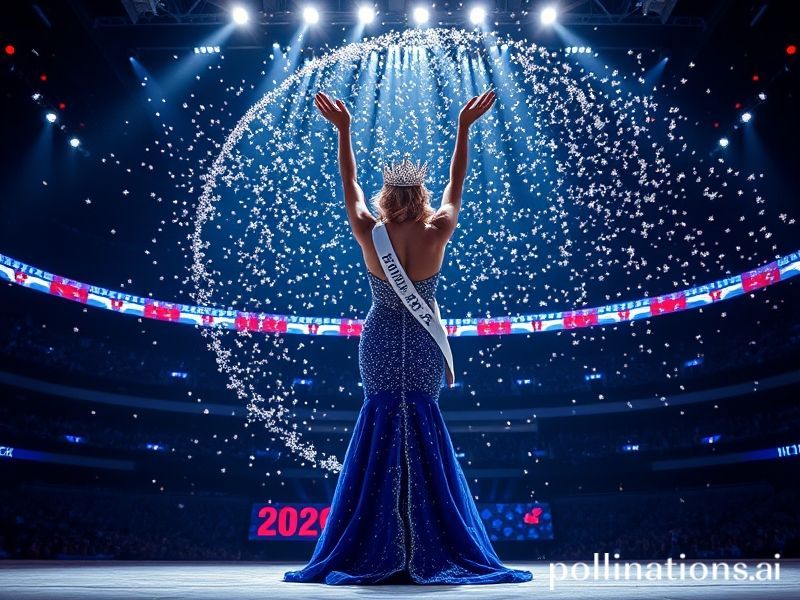Miss America 2026: Global Spectacle or Imperial Soft-Power Pep Rally?
2026 Miss America: The World Watches a Nation Crown Another Brand Ambassador in a Swimsuit
Las Vegas—If you squint past the LED glare and the mandatory smiles, the 2026 Miss America Pageant looks less like a beauty contest and more like an annual shareholders’ meeting for the United States’ soft-power division. Delegates from fifty states—plus Puerto Rico, which Washington continues to treat like a moody teenager who might storm off to the EU any day—will parade, twirl, and recite rehearsed answers about “healing the nation” while the rest of the planet wonders why the richest country on Earth still needs a tiara to feel validated.
Globally, the spectacle arrives at an awkward moment. Europe is busy rewriting agricultural policy to keep its glaciers from relocating to the Mediterranean, China just launched another lunar rover named after a Tang-dynasty poet, and India’s cricket board is negotiating broadcast rights that exceed the GDP of several Pacific island nations. Meanwhile, 6.2 million American households are tuning in to see whether Miss Idaho can balance a flaming baton and a STEM degree without tripping over geopolitics. Call it cultural whiplash; call it Thursday night.
International correspondents, flown in on comped Southwest vouchers and assigned rooms whose minibars only stock Diet Coke and moral ambiguity, have been instructed by their editors to look for “global resonance.” Translation: find a contestant whose talent segment references the war in Ukraine without actually saying “war” or “Ukraine.” Early betting markets—curated by bored hedge-fund interns on the Discord server “Tiara Arbitrage”—favor Miss New Jersey, whose baton-twirling routine is allegedly a meditation on supply-chain disruptions. Second place: Miss Oregon, performing a spoken-word piece about microplastics that somehow rhymes “oceanic gyre” with “aspire.”
The pageant’s official theme, “Empowering Voices, Igniting Futures,” is printed on banners made from recycled campaign yard signs, a sustainability flourish that impressed exactly no one at the UN Climate Summit last month. Delegates from Fiji, still mopping up after their third cyclone of the year, sent a diplomatic cable that simply read, “Cute.” But Washington insists the event remains a vital diplomatic tool. After all, the winner gets a year-long “national speaking tour” that historically includes photo ops with NATO officers and at least one very confused African finance minister.
Over in the press tent, a French reporter from Le Monde is live-tweeting the swimsuit competition with the resigned air of a man who once covered the fall of Saigon. “They still call it ‘Lifestyle and Fitness,’” he mutters, stubbing out a Gauloise. “As if abs alone could deter hypersonic missiles.” A German freelancer nods, calculating how many kilowatts of renewable energy could be harvested if every contestant’s hairspray were converted to biofuel. The consensus: enough to power Frankfurt’s Christmas market through at least three coalition collapses.
The real intrigue happens backstage. Delegations from the Gulf states—invited this year as “cultural observers” after last year’s oil-for-sparkle deal—are reportedly negotiating a side agreement to franchise the pageant in Riyadh by 2028, complete with abaya-compliant eveningwear and a talent segment judged by AI. Beijing, not to be outdone, has floated plans for a rival “Miss Harmonious Society” where contestants compete via hologram to reduce carbon footprints. The winner receives a social-credit bonus and a lifetime subscription to state-approved lipstick.
Yet for all the eye-rolling, the broadcast still pulls 15 million live viewers across Latin America, where Univision adds its own commentary track comparing delegate gowns to regional inflation rates. (“That iridescent mermaid silhouette? Pure Argentine peso energy.”) In Lagos, watch-party hosts run betting pools on which contestant will flub the “world peace” question; in Seoul, K-pop trainees study the choreography for tips on smiling while dehydrated.
At 10:47 p.m., the crown is lowered onto the perfectly coiffed head of Miss Colorado, a cybersecurity analyst who twirled a fire baton shaped like a USB drive. Confetti cannons misfire, pelting the front row with shredded NDA agreements. She thanks “our troops, our teachers, and the algorithm.” The band strikes up “America the Beautiful,” which, by sheer coincidence, is now available as a non-fungible anthem on the blockchain.
Outside, the Strip resumes its usual neon heartbeat. A British tourist shrugs: “It’s like Eurovision without the irony, or the songs.” Somewhere in Brussels, a NATO general quietly adds “pageant diplomacy” to the threat matrix. And somewhere else—perhaps in a data center cooled by glacier runoff—an AI scrapes every frame of the broadcast, learning exactly what humanity values when the cameras are rolling and the world is burning.
The crown gleams, the ratings hold, and the planet keeps spinning, slightly embarrassed but unable to look away.







